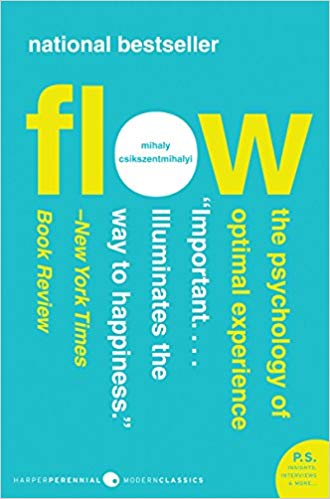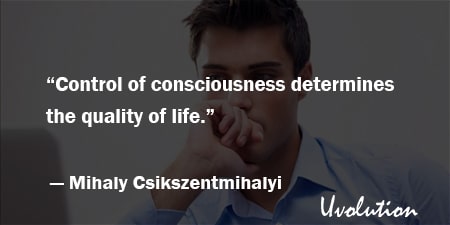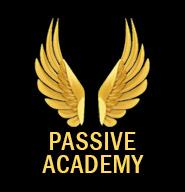Flow by Mihaly Csikszentmihalyi Summary
The Book in 1 Sentences
Flow: The Psychology of Optimal Experience
“We have called this state the flow experience, because this is the term many of the people we interviewed had used in their descriptions of how it felt to be in top form: ‘It was like floating,’ ‘I was carried on by the flow.’ It is the opposite of psychic entropy… and those who attain it develop a stronger, more confident self, because more of their psychic energy has been invested successfully in goals they themselves had chosen to pursue.” ~ Mihaly Csikszentmihalyi
9 BIG Ideas
1. Changing the Contents of Consciousness
3. Focus Your Attention ( Psychic Energy )
4. FLOW = in the Boundary Between Boredom and Anxiety
5. How a Culture Can Build Flow
6. Flow at Work Vs. at Free time
7. Transform Adversity into an Enjoyable Challenge!
Flow Book Summary
1. Changing the Contents of Consciousness
“A person can make himself happy, or miserable, regardless of what is actually happening ‘outside,’ just by changing the contents of consciousness.
We all know individuals who can transform hopeless situations into challenges to be overcome, just through the force of their personalities.
This ability to persevere despite obstacles and setbacks is the quality people most admire in others, and justly so; it is probably the most important trait not only for succeeding in life, but for enjoying it as well.
To develop this trait, one must find ways to order consciousness so as to be in control of feelings and thoughts. It is best not to expect shortcuts will do the trick.”
2. Know + DO!
“It is not enough to know how to do it; one must do it, consistently, in the same way as athletes or musicians must keep practicing what they know in theory.”
Michael Bernard Beckwith - in his book Spiritual Liberation says: “To agree with the keys described here is one thing, to practice them is another. To read and study and have conversations about spiritual practices is good, but unless you incorporate them into your life, you won’t embody or integrate them—which means you aren’t receiving their benefits.
Ask yourself, ‘How can I now move from theory into practice?’ If you merely collect spiritual information without practicing it, all you will develop is a case of spiritual indigestion and constipation.”
So, it’s not about knowing something! It’s about doing it… It’s about moving from theory to practice.
3. Focus Your Attention ( Psychic Energy )
“The mark of a person who is in control of consciousness is the ability to focus attention at will, to be oblivious to distractions, to concentrate as long as it takes to achieve a goal, and not longer. And the person who can do this usually enjoys the normal course of everyday life.”
And remember that “Health, money, and other material advantages may or may not improve life. Unless a person has learned to control psychic energy, chances are such advantages will be useless.”
4. FLOW = in the Boundary Between Boredom and Anxiety
“In all the activities people in our study reported engaging in, enjoyment comes at a very specific point: whenever the opportunities for action perceived by the individual are equal to his or her capabilities.
Playing tennis, for instance, is not enjoyable if the two opponents are mismatched. The less skilled player will feel anxious, and the better player will feel bored.
The same is true for every other activity… Enjoyment appears at the boundary between boredom and anxiety, when the challenges are just balanced with the person’s capacity to act.”
So, if our skills are far greater than the challenge, we’ll feel bored. And if the challenge is far greater than our skills, we’ll get anxious.
Csikszentmihalyi continues: “The optimal state of inner experience is one in which there is order in consciousness. This happens when psychic energy—or attention—is invested in realistic goals, and when skills match the opportunities for action.
The pursuit of a goal brings order in awareness because a person must concentrate attention on the task at hand and momentarily forget everything else. These periods of struggling to overcome challenges are what people find to be the most enjoyable of their lives.
A person who has achieved control over psychic energy and has invested it in consciously chosen goals cannot help but grow into a more complex being. By stretching skills, by reaching toward higher challenges, such a person becomes an increasingly extraordinary individual.”
Reflect on yourself for a moment…
If you’re anxious, what can you do to get into flow?
May be by setting more realistic goals or developing your skills to match the challenge over time.
If you’re bored, how you can add more of a challenge?
5. How a Culture Can Build Flow
“Another good example of how a culture can build flow into its life-style is given by the Canadian ethnographer Richard Kool, describing one of the Indian tribes of British Columbia:
The Shushwap region was and is considered by the Indian people to be a rich place: rich in salmon and game, rich in below-ground food resources such as tubers and roots—a plentiful land.
In this region, the people would live in permanent village sites and exploit the environs for needed resources. They had elaborate technologies for very effectively using the resources of the environment, and perceived their lives as being good and rich.
Yet, the elders said, at times the world became too predictable and the challenge began to go out of life. Without challenge, life had no meaning.
So the elders, in their wisdom, would decide that the entire village should move, those moves occurring every 25 to 30 years. The entire population would move to a different part of the Shushwap land and there, they found challenge.
There were new streams to figure out, new game trails to learn, new areas where the balsamroot would be plentiful. Now life would regain its meaning and be worth living. Everyone would feel rejuvenated and healthy. Incidentally, it also allowed exploited resources in one area to recover after years of harvesting.’”
Adding more challenges to our lives makes it worth living…
This is awesome!
6. Flow at Work Vs. at Free time
“Thus we have a paradoxical situation: On the job people feel skillful and challenged, and therefore feel more happy, strong, creative, and satisfied.
In their free time people feel that there is generally not much to do and their skills are not being used, and therefore they tend to feel more sad, weak, dull, and dissatisfied. Yet they would like to work less and spend more time in leisure.”
Weird, isn’t it?! But true…
And remember: “Because work is so universal, yet so varied, it makes a tremendous difference to one’s overall contentment whether what one does for a living is enjoyable or not.
Thomas Carlyle was not far wrong when he wrote, ‘Blessed is he who has found his work; let him ask no other blessings.’ Sigmund Freud amplified somewhat on this simple advice. When asked his recipe for happiness, he gave a very short but sensible answer: ‘Work and love.’”
7. Transform Adversity into an Enjoyable Challenge!
“When adversity threatens to paralyze us, we need to reassert control by finding a new direction in which to invest psychic energy, a direction that lies outside the reach of external forces. When every aspiration is frustrated, a person must seek a meaningful goal around which to organize the self.”
Csikszentmihalyi tells stories about prisoners of war and how they endured solitary confinement by creating elaborate goals in their heads (from memorizing poetry to playing virtual golf in their minds) to reassert control of their consciousness in the face of incredible adversity.
As he says, the more stressful the external circumstances, the more important it is we put our attention on goals we can move toward.
And remember that: “Of all the virtues we can learn no trait is more useful, more essential for survival, and more likely to improve the quality of life than the ability to transform adversity into an enjoyable challenge.”
“Being in control of the mind means that literally anything that happens can be a source of joy.”
8. Achieving Inner Harmony (Feelings, Thoughts & Actions)
“Someone who knows his desires and works with purpose to achieve them is a person whose feelings, thoughts, and actions are congruent with one another, and is therefore a person who has achieved inner harmony.”
9. Reform Yourself First!
“But no social change can come about until the consciousness of individuals is changed first.
When a young man asked Carlyle how he should go about reforming the world, Carlyle answered, ‘Reform yourself. That way there will be one less rascal in the world.’ The advice is still valid.
Those who try to make life better for everyone without having learned to control their own lives first usually end up making things worse all around.”
Ervin Seale - in his book Take Off from Within – says: “Overconcern for a suffering world is often a projection of one’s own need. And many a needy one has helped himself by helping others.
Some have become ineffectual nuisances because they did not realize that the main business of living is individual growth, the seeking of the kingdom of heaven which is within. Let one take care of what has been given him—his thoughts, sensations, faculties, and he will be the best of all help to his fellow men.
Of all the people I know who are serving society, those who are making the greatest contributions in alleviating human ills and wants are those who have themselves in hand.”
And remember that Gandhi tells us we must be the change we want to see in the world…
That was my QUICK summary of the great book "Flow". If you’re interested, get your copy. There is a HUGE amount of wisdom and life-changing ideas in this book, and we’ve only touched on a tiny bit of it.
Buy The Book: Flow by Mihaly Csikszentmihalyi

GET Blinkist 7 Days FREE Trial
3000+ Book Summaries
(Audio and Text)





